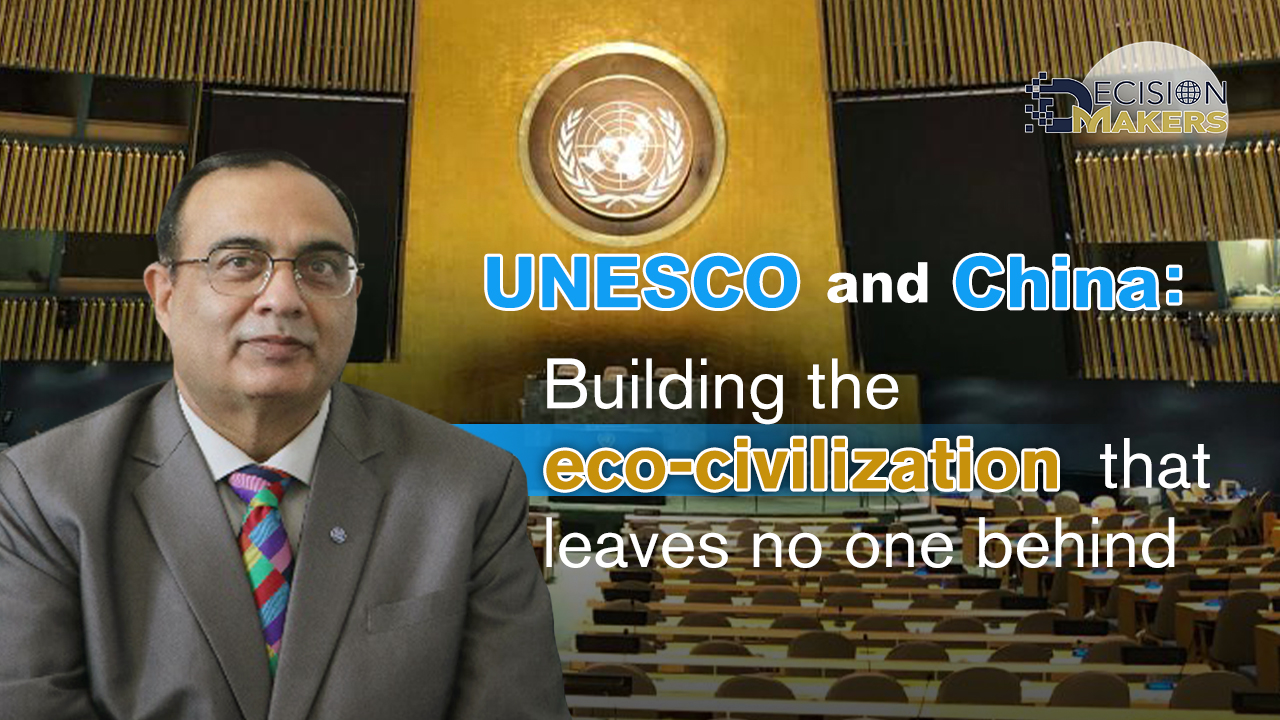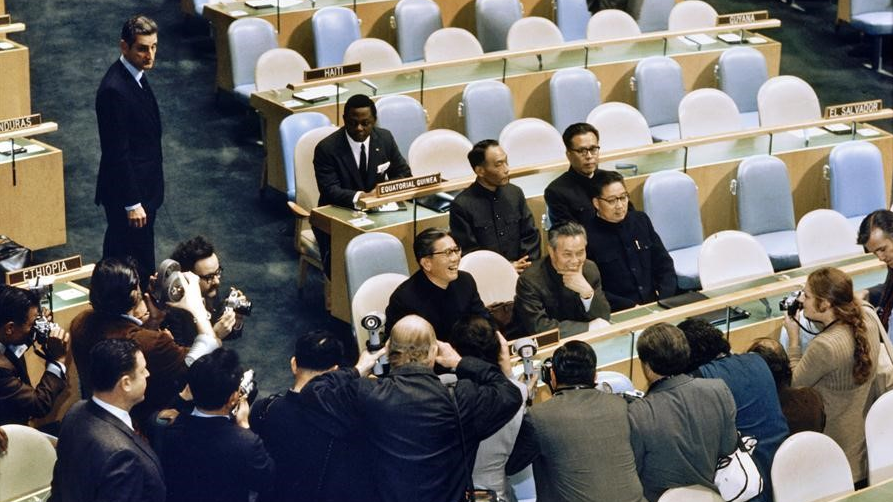
Editor's note: Decision Makers is a global platform for decision makers to share their insights on events shaping today's world. Professor Shahbaz Khan is the director of the UNESCO Office in Beijing and UNESCO representative to the Democratic People's Republic of Korea, Japan, Mongolia, the People's Republic of China, and the Republic of Korea. The article reflects the author's opinions and not necessarily the views of CGTN.
"Etiquette and culture are learned after people's granary becomes full. Honor and shame are distinguished when the folks have enough to eat and wear." The words from the ancient Chinese statesman and philosopher, Guan Zhong, living in the Spring and Autumn Period about 2,700 years ago, demonstrate the Chinese philosophical wisdom in discerning the linkage between material abundance and social progress.
Since China resumed its rightful place in the United Nations 50 years ago, its economic success has left the world in awe. As the most populous country, China has become the second-largest economy within half a century and accomplished the greatest feat of poverty alleviation in human history. The scale of China's economic prowess has become the most studied subject of scholarly research – factors that lead to China's material wealth are put under the microscope of a myriad of economic metrics and political analysis. Nonetheless, the measurement of China's achievement in social progress, that is, China's "intangible wealth" in education, sciences, culture, communication and information, would require a different set of lenses.
China's contributions to education, sciences and culture
China joined UNESCO on November 4, 1946. The United Nations General Assembly Resolution 2758 was passed on October 25, 1971, recognizing the People's Republic of China as "the only legitimate representative of China to the United Nations." The UNESCO Beijing Cluster Office was established in 1984. The president of the People's Republic of China, Xi Jinping, made the historic visit to UNESCO's headquarters in Paris in March 2014 as the first-ever Chinese head of state to visit the organization. Over the span of a person's lifetime, the precious partnership between UNESCO and China has matured and grown ever stronger.
Since the inception of this historic relationship, UNESCO has been closely linked with China's steady and astonishing social progress:
• In the cultural sphere, China has ratified five UNESCO culture conventions, and has made a remarkable contribution to global cultural safeguarding and development efforts by adding 56 sites to the World Heritage List, 42 elements to the lists and register for Intangible Cultural Heritage (ICH), and 14 cities to the UNESCO Creative Cities Network.
• In the realm of nature and science, China has made eminent contributions in enhancing the harmony between human and nature on a scientific and institutional basis by establishing 34 biosphere reserves in UNESCO's Man and the Biosphere (MAB) program, 41 UNESCO Global Geoparks and four global water museums. China is also contributing to international science cooperation and networking to enhance institutional capacities and promote knowledge sharing by systematically building a series of science-related Category 2 centers.
• In the domain of education, China has seven education-related UNESCO chairs. In realizing its commitment to support the implementation of the 17 Sustainable Development Goals (SDGs), notably to "ensure inclusive and equitable quality education and promote lifelong learning opportunities for all" (SDG 4) and "make cities and human settlements inclusive, safe, resilient and sustainable" (SDG 11), China has established several institutions which are members of the UNESCO-UNEVOC network that aims to strengthen and upgrade China's Technical and Vocational, Education and Training (TVET) systems and has a group of cities that are members of the UNESCO Global Network of learning cities.

Delegation of the People's Republic of China is seen taking seats for the first time at the UN Assembly Hall in the UN headquarters in New York, U.S., October 1971. /Xinhua
Delegation of the People's Republic of China is seen taking seats for the first time at the UN Assembly Hall in the UN headquarters in New York, U.S., October 1971. /Xinhua
Leaving no one behind
From UNESCO's perspective, China's intangible social wealth is not simply a display of strength in numbers, namely stacks of eye-catching statistics on governmental brochures and business spreadsheets, but possesses a genuine humanistic concern for the most vulnerable, marginalized and underprivileged members of the society. It resonates with UNESCO's fundamental humanist mission in shaping an inclusive and equitable society that "leaves no one behind."
Over the past decades, China has made tremendous efforts in promoting the lives and livelihoods of the over 85 million people with disabilities living in the country. Following more than 130 laws and administrative regulations formulated concerning the protection of rights of the disability community in China, over 1,700 cities and counties nationwide have initiated efforts to improve accessibility and remove barriers for persons with disabilities. Just last month, China's first legislation on barrier-free city construction took effect in Shenzhen, once again showing the country's unwavering commitment to promoting the construction of a barrier-free environment for all.
In support of China's efforts in carrying forward this endeavor, UNESCO, also in its capacity as Chair of the UN Theme Group on Disability in China, has been working alongside persons with disabilities as well as governmental and non-governmental stakeholders to promote inclusive education, tackle disability-related stigma and discrimination in and through media, and harness technology and innovation for better access to information and knowledge for persons with disabilities.
On a different note, China has lifted 770 million rural population out of poverty, which accounts for 70 percent of the world's total poverty reduction. In this unprecedented endeavor, more than 7 million persons with disabilities have been lifted out of poverty, around half of which are women. Based on the roadmap of China's 14th Five-Year Plan which pledges to advance rural revitalization, over 2,000 "ICH for Poverty Alleviation Work Stations" established nationwide and over 400,000 people who gained employment were milestone achievements that demonstrate China is right on the highway of realizing the 2030 Agenda with culture as an enabler and driver of sustainable development. This sets a powerful example of a strong government and political leadership fulfilling its commitment to inclusive sustainable development, which pledges to leave no one behind.
UNESCO and China share the vision of conserving heritage, fostering intercultural dialogue and promoting mutual prosperity. In collaboration with UNESCO, China has been actively providing financial assistance and technical support in heritage conservation and cultural development to other developing countries, especially via the Belt and Road Initiative and the South-South networks. UNESCO will continue to leverage the Chinese knowledge and experience and bring good practices from China to other developing countries as needed.
(If you want to contribute and have specific expertise, please contact us at opinions@cgtn.com.)

